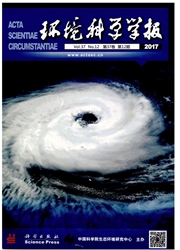

 中文摘要:
中文摘要:
提高市政污泥脱水性能是当前污泥预处理中的热点和难点.本文以毛细吸水时间(CST)作为衡量污泥预处理中脱水性能的指标,选用钛/二氧化铅网状极板为阴、阳电极,研究了电解电压、极板间距、电解质种类及电解质投加量等因素对电化学预处理市政污泥的影响.结果表明,电压对污泥脱水性能影响较大,在电压为20 V、极板间距为2 cm、电解质为0.6 g Na Cl的条件下,电化学处理市政污泥20 min效果最佳,污泥的CST下降率在90%以上.进一步探究表明,电解过程中污泥菌胶团结构首先被破坏,释放大量结合水,且菌胶团内的蛋白质和多聚糖释放到上清液中,二者浓度先升高;随后二者部分氧化分解,浓度降低,从而有效提高市政污泥脱水性能.
 英文摘要:
英文摘要:
It is a hotresearch topic for improving the dewaterability of municipal sludge in pretreatment. In this study,Ti/PbO_2 mesh plate electrodes were explored as the anode and cathode to treat municipal sludge. The capillary suction time( CST) was used to quantify the sludge dewaterability. The effects of the operating parameters on sludge pretreatment performance were investigated including electrolytic voltage,electrode gap,electrolyte species,and the dosage of electrolyte. The results show that electrolytic voltage was of significance to the sludge dewaterability. The optimal parameters were 20 V of voltage,2 cm of electrode distance,0. 6 g Na Cl,and 20 min of electrolysis time. Under these optimal parameters,the CST of sludge has decreased significantly over 90%. Further exploration showed that the sludge structure was destroyed firstly with the release of a large number of bound water. During the initial stage of electrolysis,relatively high amount of proteins and polysaccharide were also released into supernatant. Then,their concentration decreased since part of proteins and polysaccharide was further decomposed by electrooxidation. Afterwards, it was effectively improved for the dewaterability of the municipal sludge.
 同期刊论文项目
同期刊论文项目
 同项目期刊论文
同项目期刊论文
 期刊信息
期刊信息
